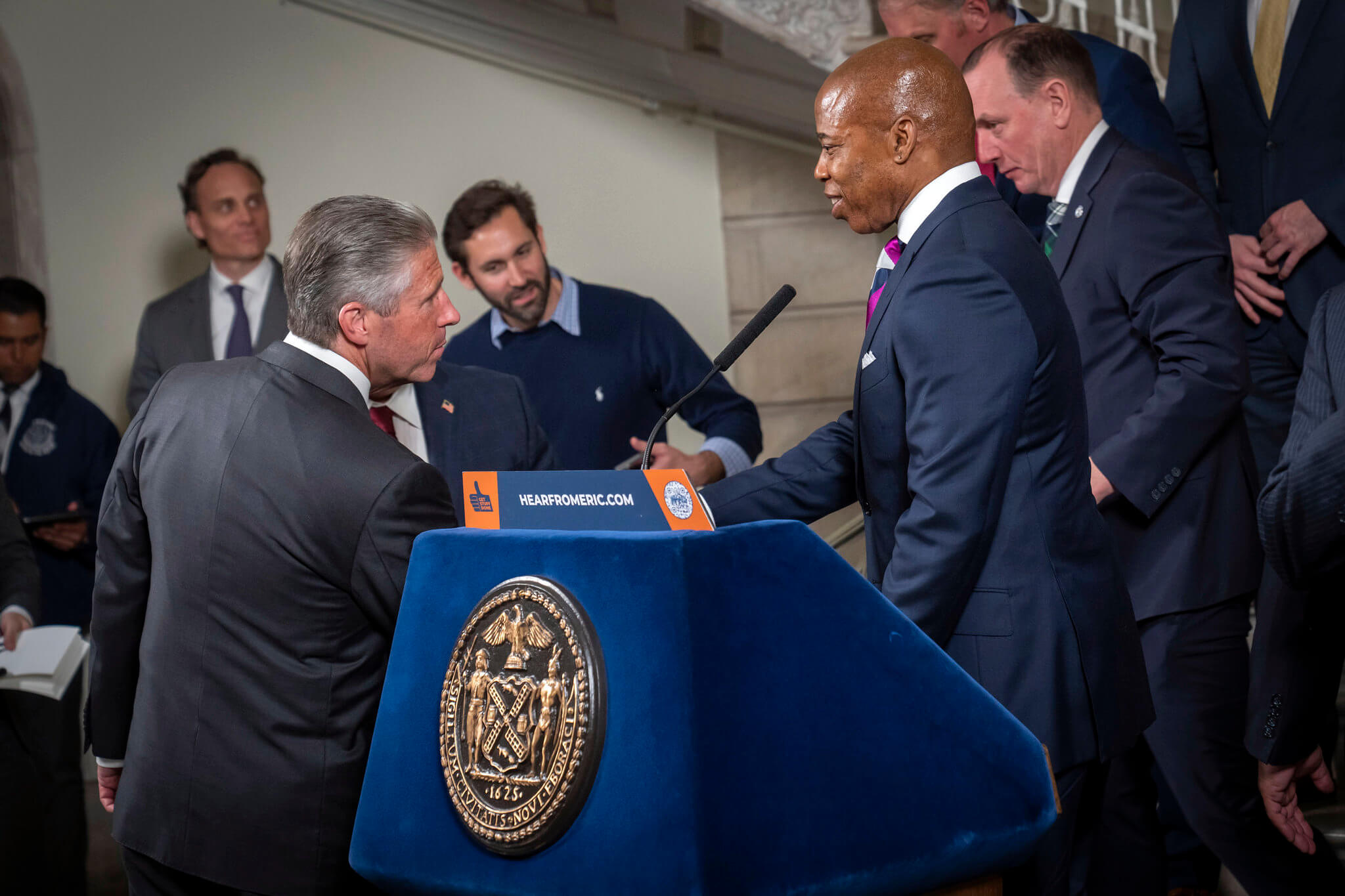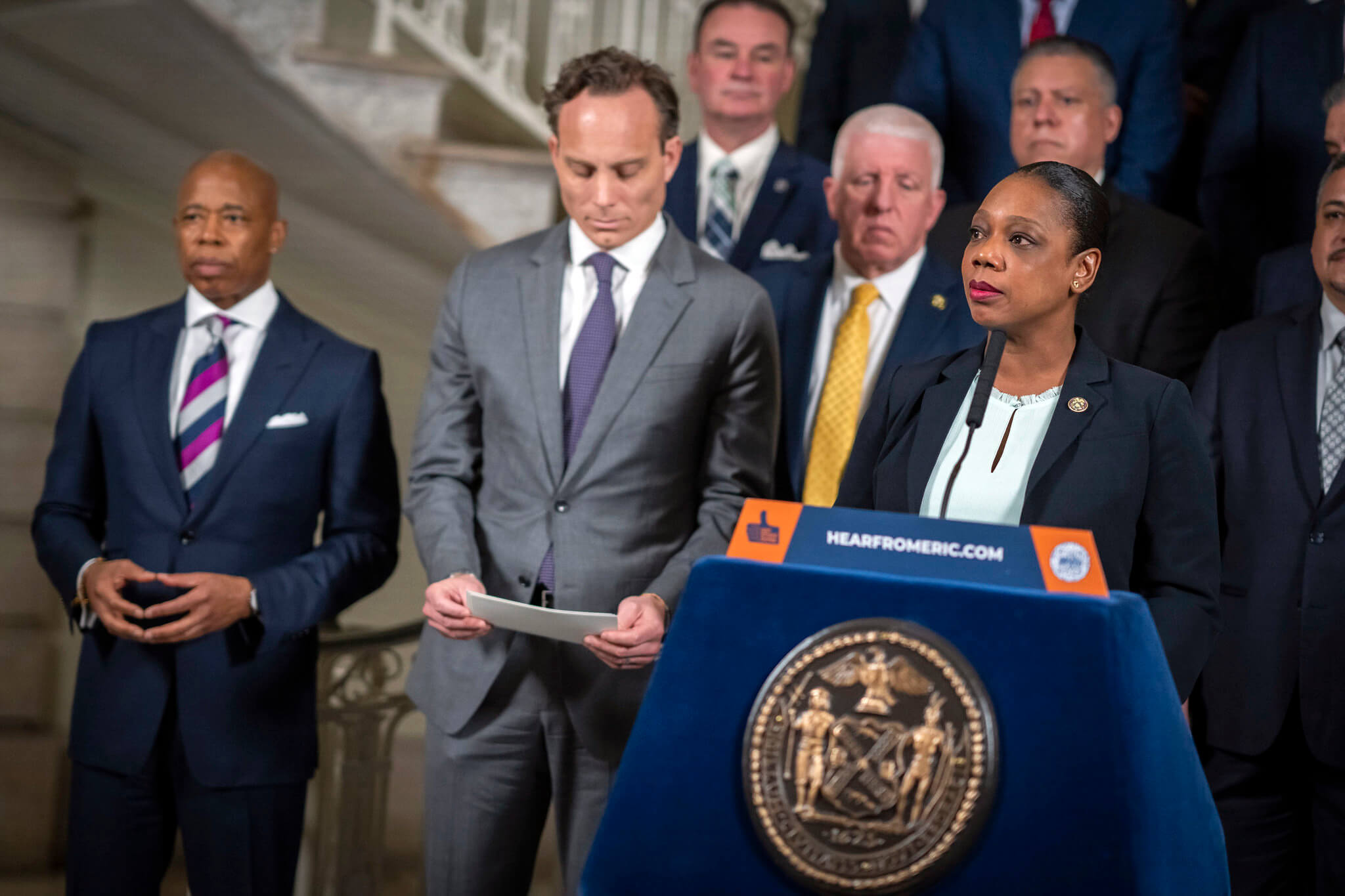Police officers’ union inks tentative $5.5B deal with city, includes …
The city has reached a tentative £5.5 billion contract agreement with the Police Benevolent Association (PBA), Mayor Eric Adams announced on Wednesday, marking the second major labor deal his administration has negotiated with the city's public sector unions and the first with one of its uniformed unions. The eight-year tentative agreement, which is retroactive going back to 2017 -- covering the six years the PBA has gone without a contract -- includes raises of 2.25% for 2017, 2.50% for 2018, 3% for 2019, 3.25% for 2020 and 2021, 3.50% for 2022 and 2023 and 4% for 2024. The contract -- set to cover 23,000 uniformed NYPD officers -- also boasts a new flexible work pilot program that will allow cops to clock extended 10-to-12-hour shifts and an equity fund to raise the salaries of entry-level offices from roughly £42,500 to £53,790-a-year, plus a "neighborhood policing differential payment" of £1,210.
When announcing the deal during a press conference at City Hall on Wednesday morning, Adams -- a former NYPD captain himself -- said that, given the importance of public safety to New Yorkers, he understood the need for providing a fair contract to the department's uniformed officers. "Today we're making clear that New York City supports the men and women of the NYPD as they do one of the toughest jobs anywhere," Adams said. "This is a historic deal, only the third voluntary contract with the PBA in 30 years. One that will make sure our officers get the benefits and compensation they deserve, allow them to work a more flexible schedule, build morale going forward and make sure that New York remains the safest big city in America."
 Mayor Eric Adams shaking hands with PBA President Patrick Lynch as he announces the city's tentative deal with the union.Ed Reed/Mayoral Photography Office
Mayor Eric Adams shaking hands with PBA President Patrick Lynch as he announces the city's tentative deal with the union.Ed Reed/Mayoral Photography Office
The contract is tentative until it's ratified by the PBA membership, which is expected by the end of this month, according to city Office of Labor Relations Commissioner Renee Campion.
It follows the city reaching a tentative 5-year £4.4 billion deal with District Council 37 in February.[1] Lynch said conversations with City Hall around the contact started as soon as Adams came into office in January 2022 and have continued on a "daily basis" since. That ongoing dialogue stands in sharp contrast to the far more adversarial relationship PBA President Patrick Lynch and the union had with Adams' predecessor, Bill de Blasio.
"I've done this for a day or two and I've stood outside this building and came up with creative chants and held many signs," Lynch said. "I must say it's better and more productive to be inside the building with all of the folks who played a part in this." The PBA president said the constant communication with Adams' office was essential to drafting a contract that allows NYPD officers to have a good quality of life in the city they patrol. "Over 60% of our members live in the confines of New York City," Lynch said. "And we wanted to get to a point where they can work in New York City and live in New York City.
And we made strides to get there." Lynch also applauded the new flexible work pilot program, which would allow cops to work longer shifts on fewer days. The pilot is starting in four different precincts: two in the Bronx, one transit district and one housing service area.
Officers participating in the pilot can choose from a variety of options for the modified schedules, according to NYPD Commissioner Keechant Sewell, but they'll continue to work the same number of hours per year that they do now -- 2,088. According to Sewell, rather than lessening the number of cops on the street, the modified schedules will allow the department to deploy cops at more strategic times. "It's important to note that they're working the same number of hours per year, they're just making fewer appearances," the commissioner said. "So, the way the chart is staggered, public safety is not compromised in any way.
We're actually able to have more officers during peak times, school dismissals, rush hour, because of the modified charts."
 NYPD Commissioner Keechant Sewell.Ed Reed/Mayoral Photography Office
NYPD Commissioner Keechant Sewell.Ed Reed/Mayoral Photography Office
Lynch said the altered schedules will allow cops to spend more time with their families and "decompress." "It allows our members to decompress," he said. "There's mental health issues when you're working five, six days a week, 12-hour days, and not to go home and decompress." Adams unveiled the potential contract a day after his Office of Management and Budget sent a missive to all city agency heads instructing them to slash their budgets by 4% for the coming fiscal year as well as the outyears.
Although Adams is making the new cuts in the name of needing funds for contract settlements like the one reached Wednesday, he said the timing of the latest belt-tightening initiative and the labor agreement aren't connected.[2]
Instead, the mayor said the new cuts resulted from a confluence of factors including potential diminished tax revenue, the cost of the migrant crisis and the drying up of pandemic-era aid.
"There are many rivers that are feeding the economic crisis we are facing: Wall Street, migrants, asylum seekers, the lack of tax revenue, dollars that are being absorbed at the end of next year as part of the federal government," Adams said. "So, it wasn't timed at all."
References
- ^ reaching a tentative 5-year £4.4 billion deal (www.amny.com)
- ^ instructing them to slash their budgets by 4% (www.amny.com)